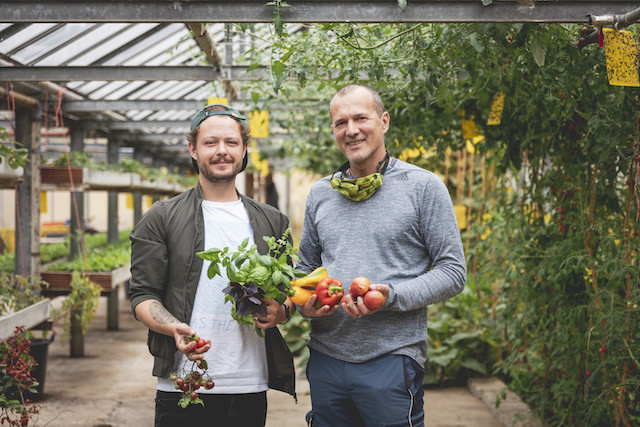Even with the easting of restrictions, the food industry has been hard hit. Despite some restaurants having suffered, on the local production side there were some unexpected opportunties to meet demand--but not without a bit of creativity.
Senad Alic and Danny Hutchines are a dynamic duo, quite literally the growing forces behind Letzgrow. The company is the brainchild of Alic, who formulated the idea six years ago but says he concretely began the practice about three years ago. “The original idea behind the business was a combination of growing healthy foods, but also a bit of frustration around food today,” Alic says. “What do we eat? How is it made? Where is it produced?”
Alic’s goal was to grow organically using a no-dig approach, and he researched techniques on how to do so with a minimal carbon footprint. Alic, who previously worked for 20 years in the finance sector, hails Luxembourg’s “organised collection of organic waste”, which can be used for compost, and Letzgrow’s philosophy is “to feed the soil rather than plants. It’s a marathon rather than a sprint.”
Hutchines, born in Luxembourg to English parents, joined the team after travelling for 13 months. His experience included working in a garden in a Guatemalan jungle, and he wanted to keep gardening upon his return home: “From the moment Senad and I sat down, it made sense that we work together.”
Their main gardens and greenhouses are based in Gonderange and Junglinster. Before the pandemic, the small team had already been delivering their high-quality produce to restaurants. And then lockdown hit. “We had a bit of a crisis meeting, thinking, ‘Oh my God, what are we going to do?’, obviously the restaurants being our main lifeblood,” Hutchines recalls. “But then we sat down, put our heads together... it took us about 24 hours, and we came up with the concept of a drive-through.”
People could order online through the group’s Facebook page (which already had a customer base for its family bags), and then a pick-up timeframe was scheduled. At the outdoor counter, the team ensured proper sanitary measures, such as non-contact payments. “It grew week to week,” Hutchines adds. “It was like a whole separate business had just popped up because of the covid situation.” Alic estimates the group increased by 50% in under four months. The latest result: the team opened its pop-up shop over the summer (for hours, it’s best to check their Facebook group page).
While gardening and supplying require huge time investments--Hutchines says “if we could add another 6 to 7 hours a day, we’d be golden”--the team still takes time to share educational tips with its community. After their plant sales over the lockdown period, the team sent messages to its community on plant care, for example, reminding people to bring plants indoors when the late frost hit. That community spirit is reciprocated too: their buyers often post images of dishes they’ve made from Letzgrow’s produce.
“You hear [Prime Minister Xavier] Bettel [talk about] solidarity, and that was among the positive things in this madness of corona, this feeling of community,” Alic adds. “People who never even thought of growing something started to grow during this period, [and] we are trying to motivate people to continue with that mindset… if you spend 15-20 minutes a day in your garden, growing a few herbs, it has so many benefits.”
An alternate version of this article appeared in the Delano October/November 2020 print edition.
